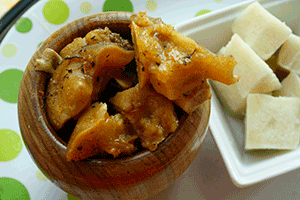Two special meat recipes many Nigerians relish, even without knowing their origin, are nkwobi and isi ewu. This week, we serve you the former…
Nkwobi. That is onomatopoeia (in Igbo language) for hewing a sizeable chunk of meat with a big culinary knife. Just imagine cutting the cooked cartilage of cow tail or leg.
The delicacy originated from the Eastern part of the country – it has been traced to Mbaise in Imo State, where it is served alongside fresh raffia palm wine. But now, the dessert has become so popular and a favourite of so many people in different parts of the country. Majorly prepared with special parts of the cow meat (leg, tail, ear, nose and lips) and local spices, nkwobi has become a culinary delight.
Ugba (oil bean seed) is an important and even cheap source of protein. On its own, nkwobi is tasty; but when ugba is added, it becomes absolutely mouth-watering.
Nkwobi – prepared with potash, palm oil, eketeke (saturated palm oil), pepper and salt – is a traditional evening recipe. It is a real favourite among Nigerians, who are known to consume peppery foods, flavoured with chillies and various spices while relaxing with beer or other related drinks.
Nutrients in nkwobi
Meat from herbivores is highly nutritious, as the animals feed on no artificial nutrients. It is rich in many essential vitamins that help in the freshness of the skin and total wellbeing like vitamins B1 (thiamin), B2 (riboflavin), B3 (niacin) and B12 (cobalamin), as well as iron, phosphorus, potassium, zinc, copper and selenium. All these nutrients work together to help promote good health.
Goat meat, which can be used for nkwobi, also provides a thinner protein source than beef, lamb, chicken and pork. This means that it is low in saturated fat and high in unsaturated fats, the type that helps increase the High-Density Lipoprotein (HDL), or good cholesterol that promotes healthy heart.
The American Heart Association recommends leaner meats such as goat to help decrease the risk of heart disease, stroke and other serious medical conditions.
Consumption of nkwobi is ideal for people that want to maintain strong bone and prevent bone loss due to menopause or rheumatoid arthritis (pain in the joint).
Adolescent girls and women within the childbearing age can benefit from regular consumption of meat to help replenish blood lost during menstruation and child delivery.
Children can also benefit from this nutritious treat to help attain maximum growth and development.
As regards some people who feel that nkwobi has little or no nutrients, it does, on the contrary. The fear that might arise is if someone else is cooking the delicacy in an unhygienic environment.
In preparing nkwobi, here are the main ingredients: cow leg, especially the lower part (cut into bite-able pieces), palm oil, ground calabash nutmeg (known as ehuru), ground edible potash (popularly known akanwu), ground crayfish, Scotch bonnet/atarado or ground dried pepper, onion for cooking the meat and salt.
For garnishing the nkwobi, it is advised to use utazi or scent (nchuanwu) leaf (you can make use of washed bitter leaf as an alternative).
To give nkwobi serving that traditional appearance, okwa (mini mortar) or wooden plate is used. But the depth of the okwa is what many patrons of nkwobi joints complain about. In fact, the okwa has no depth; it is just like putting the pieces of meat on a cylindrical piece of wood.
The serving is decorated by nicely sliced onions and shredded utazi leaves.
Today, nkwobi has gone from a local joint delicacy to a continental recipe served at five star hotels.













